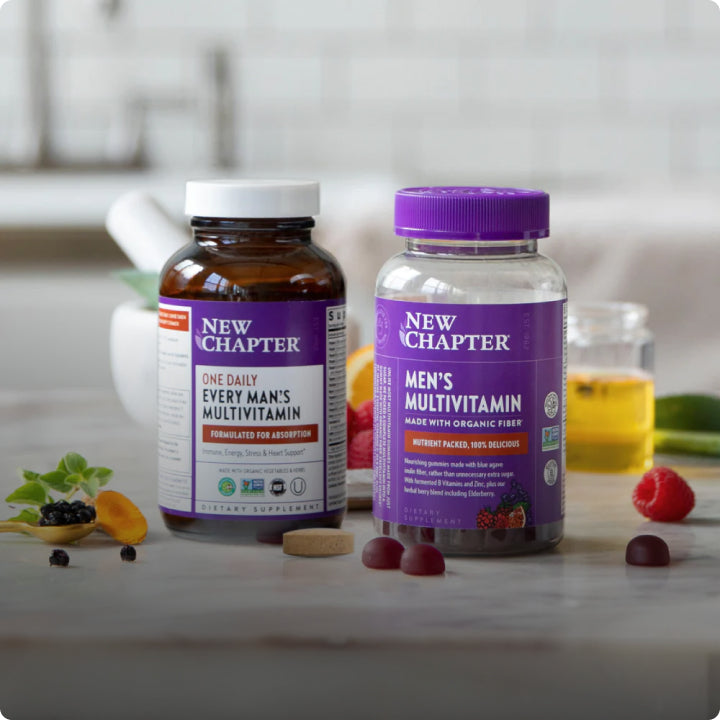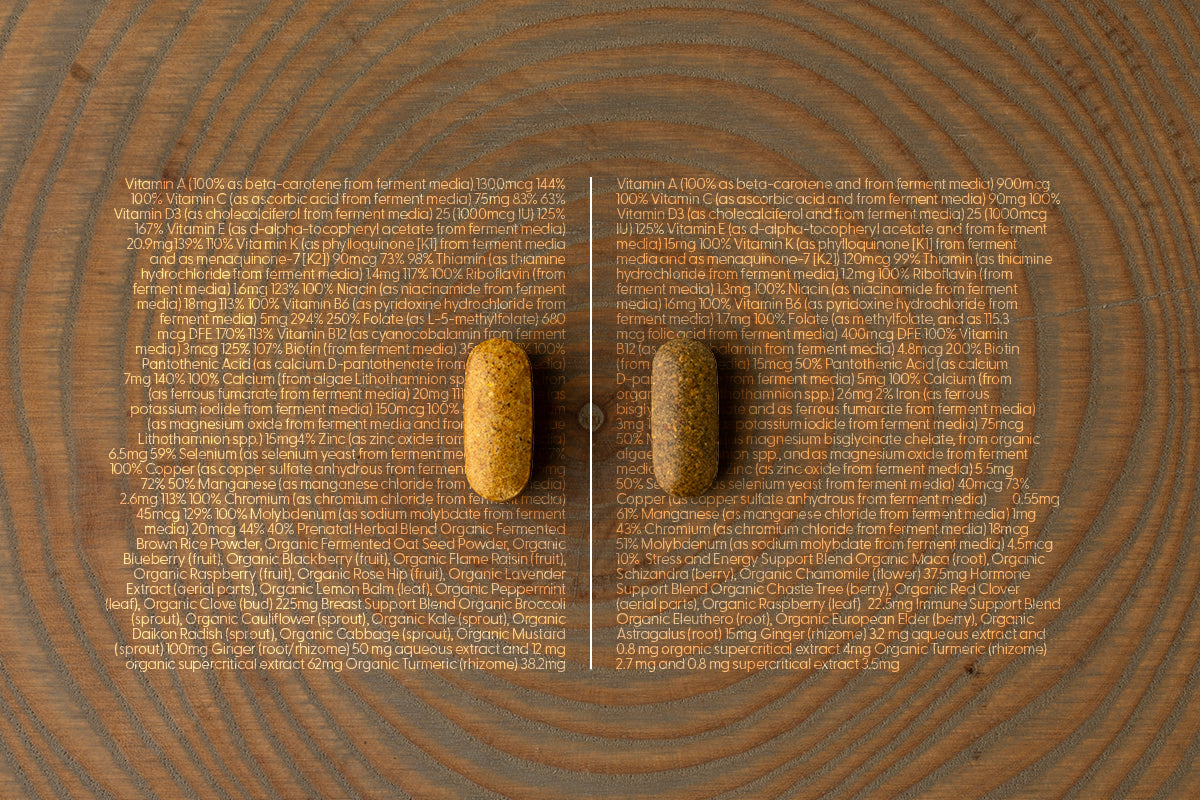The Ultimate Herbal Supplements Guide
You probably follow some kind of wellness regimen—maybe it’s regular physical activity, healthy stress management, and a daily multivitamin. Vitamins are certainly a great way to build strong foundations for health. Fermented multivitamins like New Chapter®’s are formulated to give your body the nutritional insurance you need, whether your diet is lacking certain nutrients or you just don’t have time to track everything you eat. But what if you’re looking to bring your wellness game to the next level? Is there a way to incorporate dynamic and versatile herbs into your day without having to spend hours researching which herb is right for you? The answer is YES! This ultimate guide is designed to answer your key questions about using herbs, and explain some of the easiest ways to get the right herbs into your day.
What are the benefits of including botanicals into your diet?
While nutrient deficiency is a common term for missing out on nutrition that keeps your body in balance, what about herb and spice deficiency? Is that a thing? The truth is, herbs and spices do contain beneficial phytochemicals that aren’t typically present in the standard American diet. (“Phyto” means plant—so phytochemicals are compounds specifically from plants, like beta carotene from carrots or curcumin from Turmeric.) If your daily routine lacks unique phytochemical compounds, it could mean you’re missing out on some amazing health benefits.
Use of herbs around the world
We can look at traditional eating patterns around the world for evidence. Cultures that consume herbs and spices as a part of their daily diet tend to live longer, healthier lives and have healthy inflammation balance. For example, Ginger is consumed daily in Japan, and the Japanese people enjoy one of the healthiest and longest life expectancies in the world. Likewise, people in the Mediterranean region regularly consume herbs like Rosemary and Oregano, which are antioxidant superstars, paired with healthy fats like olive oil. The Mediterranean diet has a reputation for being one of the healthiest eating patterns.
In short, plants have been helping humans stay well for millennia. In fact, herbs are so important that New Chapter proudly supports an herbal humanitarian organization, Herbalists Without Borders, that is dedicated to bringing the power of herbs to communities in need. Read our blog about this vibrant global network and how they’re sharing the power of plant medicine.
Kitchen spices and herbal supplements are not the same
Kitchen spices add flavor to dishes and can include some of the phytochemicals you want. But it’s important to note the differences between supplemental botanicals and kitchen spices. Kitchen spices for flavoring are often dried and added to food in minimal amounts (or more, if you are bold!), whereas the herbs in supplements must meet different quality standards. The best supplemental herbs are made from potent extracts that deliver phytonutrients in different (higher) ratios than you would find on your kitchen spice rack. Taking herbal supplements—and it can be just one pill a day—is an easy and convenient way to add unique botanicals to your normal routine without a lot of disruption.
For example, you may have heard that Turmeric is a great addition to your diet because of its phytonutrients called curcumin and turmerones. But the dusty yellow spice-rack version of Turmeric likely has low amounts of curcumin and no turmerones. (Since turmerones are found in the oily components of the Turmeric plant, they get left out of dried Turmeric kitchen spices.)
While you could technically get your Turmeric by cooking dishes with the powdery supermarket spice, there is another way to incorporate Turmeric into your day. To get the full benefits of Turmeric, take a full-spectrum herbal supplement that includes the plant’s phytochemicals in the ratios they occur in nature. Whole-herb supplements can have major advantages over kitchen spices in terms of quality, potency, and consistent delivery of those beneficial phytochemicals.
How to choose the right herb for you
With over 391,000 known plant species, picking an herb to support your health can feel intimidating! Herbs are also extremely versatile, which means they can be used for multiple things. This can lead to confusion when trying to research the herbs that are right for you.
Many people already understand the need for a multivitamin, as nutritional needs tend to be more mainstream. Use of herbal supplements is growing in the United States (especially Turmeric), but not yet as widespread as multivitamins. According to a 2018 survey by the Council for Responsible Nutrition, 75% of US adults age 35-54 take a multivitamin, while only 42% are taking an herbal supplement. While it’s possible to get some herbal benefits from food or tea, a convenient herbal supplement formulation that supports the areas we need most is a great way to include herbals without a lot of guess work.
What is an herbal supplement?
Imagine going to the health-food store or searching “herbals” online and being confronted with a wall of products that include different plant ingredients. How can you be sure how they work or what they do? Herbals from New Chapter are designed to make your choice easy, with botanical formulations created by an herbalist to address benefits you want most with herbs that really work—whether you're seeking sleep, hormone balance, blood pressure support, or adaptogenic benefits, to name a few.
The history of using plants to help balance health goes back tens of thousands of years. Hippocrates famously said, “Let food be thy medicine and medicine be thy food,” indicating the ancient Greeks knew well how botanicals play a role in overall health. Traditional Chinese Medicine uses the power of herbs to affect your Qi, the overall life energy said to flow along channels within the body. The Ayurvedic tradition of India balances wellness according to the elements and the effects on doshas, the three energies that circulate within the body. For more details, check out our blog on the History of Herbal Medicine.
While these traditional healing systems take distinct approaches to health, one thing is consistent in all of them: the inclusion of botanicals. Today’s scientific research validates why these herbs have been utilized traditionally for centuries. Modern science shows how herbs work and how they interact with systems in the body.
What to look for in herbal formulas
Creating effective herbal formulations is a delicate balance of science, tradition, and artistry. In Traditional Chinese Medicine, multiple herbal ingredients may be used with a philosophy of “to hit a target, throwing more than one arrow will give you a better chance of success.” Herbs can also work on different pathways in the body, and each one is important to acknowledge when, say, balancing stress. Have you ever had a nervous stomach? Stress can be felt everywhere, since our nervous system is directly connected to many places in the body, including your stomach. Combining herbs helps your body to experience botanical stress relief in different ways, one of which may be particularly effective for you.
The art of combining herbs is done by a trained herbalist. An herbalist is well versed in what natural botanicals do and how they work within the body. New Chapter is proud to have expert staff dedicated to ensuring botanical safety and quality. Each of our products is designed by holistic practitioners including herbalists and holistic nutritionists. Each formula is validated by a team of scientists: toxicologists, natural products chemists, and quality engineers.
Choosing High Quality Herbs
With so many herbs and botanicals out there, how do you know which one is the best choice? Herb misidentification and adulteration can be a problem in the herbal industry. A study was released in 2014 that found that many grape seed extracts were contaminated with peanut skin extract. In other botanicals, marjoram and oregano have a similar look and smell, and are even interchangeably used in some culinary recipes, but they are vastly different herbs.
Quality testing is an essential part of ensuring you can get the benefits of a specific herb—because if it’s not the correct ingredient in the first place, it can’t provide the benefits you’re expecting. To verify the herb in the bottle is indeed the one listed on the side of the box, New Chapter tests our ingredients for quality, purity, potency, and identity. For example, qualifying testing such as High Performance Thin Layer Chromatography (HPTLC) may be used to accurately identify botanicals. With New Chapter products you can be sure you’re getting everything you need, nothing you don’t. Read more about quality assurance and testing in our blog about our important partners, Alkemist Labs.
Sustainably grown herbs make a real difference for people & planet
When it comes to sourcing botanicals, making sustainable choices is key both for your health and for the planet’s. For example, herbs can be harvested incorrectly by novice collectors and this may harm the plant’s ability flourish in the future. Soil health can directly affect plant vitality and composition. It’s no secret that crops are often grown for high yield over nutrition, meaning you get a lot of plants, but the nutritional value may not be as high as it once was due to soil quality declining year after year. In fact, the Rodale Institute finds that conventional farming’s focus on quantity over quality means our food is actually less nutrient-dense than it was 50 years ago. The same can apply to botanicals if they are not cultivated sustainably and with great care.
So, seeking out plant ingredients that are grown sustainably whenever possible helps to strengthen the soil and our planet. And it delivers a healthy plant with a solid phytonutrient profile. This is exactly why New Chapter is dedicated to supporting regenerative agriculture, which is a growing agricultural movement with the power to reverse the worldwide depletion of farmable topsoil, and even begin to reverse climate change.
Another way to source herbals well is indigenously where they grow best. For example, India’s tropical climate and terrain make it ideal for growing Turmeric, which is why New Chapter sources Turmeric from India, because it’s bursting with Turmeric’s natural phytonutrients.
Specific herbs support specific needs
Herbs can support many systems in the body. New Chapter’s family of supplements is designed to bring you the benefits of Nature’s powerful herbs in targeted blends. With one pill daily you can customize your routine just the way you want. You can mix and match herbs and herbal blends inspired by different herbal healing traditions, such as Turmeric from Ayurvedic tradition, Ginger from Traditional Chinese Medicine, and Black Seed from the Middle East.
- Turmeric is the star of several New Chapter herbal products. It's known for supporting cardiovascular health, cognitive health, and a healthy inflammation response. When herbs have such versatile actions in the body, they often gain recognition as being an herbal for everyone.
- Ginger is also a New Chapter favorite, and is featured in Ginger Force and also Zyflamend, among many others. Ginger has been shown to be just as versatile as Turmeric, supporting your digestive system as well as also helping to balance inflammation within the body.
- Black Seed was a traditional beauty secret of Nefertiti and remnants of it were found in Tutankhamun’s tomb. Black Seed is half of our Metabolic Health blend, along with potent Turmeric. Known for supporting skin health, balancing stress in the body and promoting calm, Black Seed is a versatile herb for everyone.
How do adaptogenic herbs help with stress?
An adaptogen is an herb that supports the body in adapting to physical and biological stressors. With 83% of Americans saying they suffer from work-related stress (American Institute of Stress, 2019), many of us could use support in helping our body cope with the occasional stress of day to day life.
- Ashwagandha is a great balancing and rejuvenating ally. It can be taken at any time of day and helps manage both physical and mental stress.
- Rhodiola helps to modify your physiologic stress reactions by shifting your body's stress response and uplifting mood. It's particularly helpful during times of exertion and sleep disruption.
- Holy Basil is a remarkable adaptogen that promotes cognitive functions including focus, alertness, and healthy attention span. It also supports immune function.
What are herbs for energy?
Using botanicals to help create natural energy by supporting your body’s systems may be a helpful way to give you the energy you crave, without the crash. Rhodiola can help support mental stamina and endurance, for example. Check out our blog on naturally supporting energy with supplements to learn more about products and habits that can help you power through.
Can herbals help me with restful sleep?
Is getting a restful night’s sleep on your ongoing to-do list? It is for many of us. One survey shows that 80% of Americans struggle with sleep at least once a week (Consumer Reports Survey, 2018). Fortunately, certain herbs are associated with supporting sleep.
- Ginger can support restful sleep because it has the ability to soothe occasional pain after exercise and support the body's healthy inflammation response after exercise.* New Chapter's Restful Sleep and Pain Relief formula is designed with optimized amounts of Ginger to melt away aches, plus non-groggy Melatonin to give you the perfect pairing for falling asleep naturally.
- Other herbs like Valerian, Hops, Chamomile and Lemon Balm are also linked to soothing the body and helping you to enjoy satisfying sleep. You'll find these botanicals and more in our Zyflamend Nighttime formula especially for evening support.*
- Get more tips for improving sleep over on our dedicated blog post on this topic!
Pairing Herbs with Your Daily Multivitamin
While choosing the right herbal can seem daunting, it’s simple to enhance your routine just by taking a convenient one-daily herbal with your multivitamin. Our potent line of targeted herbal formulas are designed to give you a serious daily serving of herbs that work as hard as you do. Taking these two types of foundational products together—a multivitamin plus an herbal—is a great way to support the multiple areas of your body and help you achieve balance.






